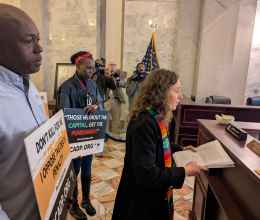
FOR IMMEDIATE RELEASE
The South Carolina House of Representatives passed legislation today that will limit the types of restraints used on pregnant people who are incarcerated and virtually abolish the practice of shackling people during labor, childbirth, and postpartum recovery. The legislation, which is on its way to Governor McMaster’s desk, includes an amendment which will further expand protections for pregnant incarcerated people. As amended, the bill will require South Carolina’s prisons, jails, and work camps to provide access to adequate nutrition and a bottom bunk and will end solitary confinement for pregnant incarcerated people under most circumstances. Additionally, prisons, jails, and work camps must ensure the availability of menstrual hygiene products for all people under their care with an active menstrual cycle and make these products available at no cost to those who cannot afford to pay. Finally, the Department of Corrections will be required to authorize weekly contact visits between incarcerated people with low or minimum-security classifications and their children.
“We are thrilled that the South Carolina Legislature has ended the cruel and inhumane practice of shackling incarcerated people during labor, childbirth, and postpartum recovery,” said ACLU of South Carolina Policy and Communications Director Ali Titus. “This legislation will greatly increase the likelihood of positive outcomes for parents and their newborn children, and we look forward to the day it is signed into law by Governor McMaster.”
The practice of shackling incarcerated people while they are pregnant, in labor, giving birth, and recovering from birth has been opposed by the nation’s leading experts in maternal, fetal, and child healthcare, including the American Congress of Obstetricians and Gynecologists (ACOG), the American Medical Association, and the American Public Health Association. Additionally, the Federal Bureau of Prisons, U.S. Immigration and Customs Enforcement, and the American Correctional Association have all adopted policies to limit the use of shackles on pregnant people who are incarcerated. Across South Carolina, criminal justice and reproductive health advocates have come together to support this legislation. The organizations include the ACLU of South Carolina; ANSWER Coalition; the Association of Women’s Health, Obstetric, and Neonatal Nurses (AWHONN); the South Carolina Perinatal Association; Justice Carolina; and the Women’s Rights and Empowerment Network.
Women’s Rights and Empowerment Network CEO Ann Warner said, “We are encouraged that the Legislature put an end to this inhumane practice and encourage policymakers to continue to work to ensure that all people have the support they need to have healthy pregnancies, deliveries, and births.”








